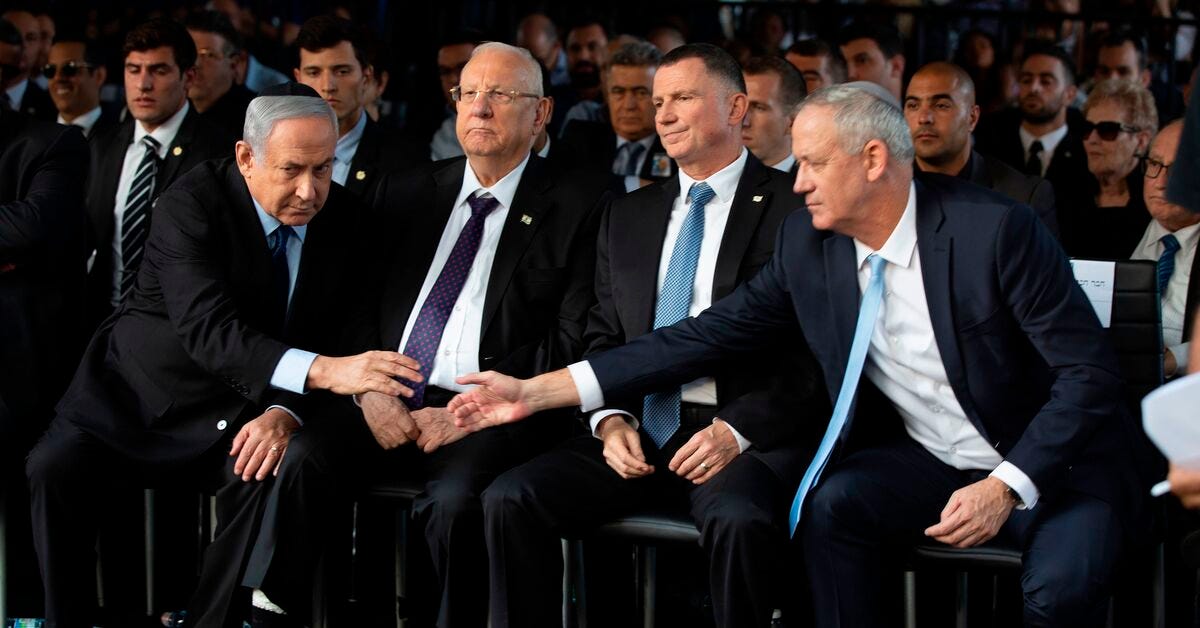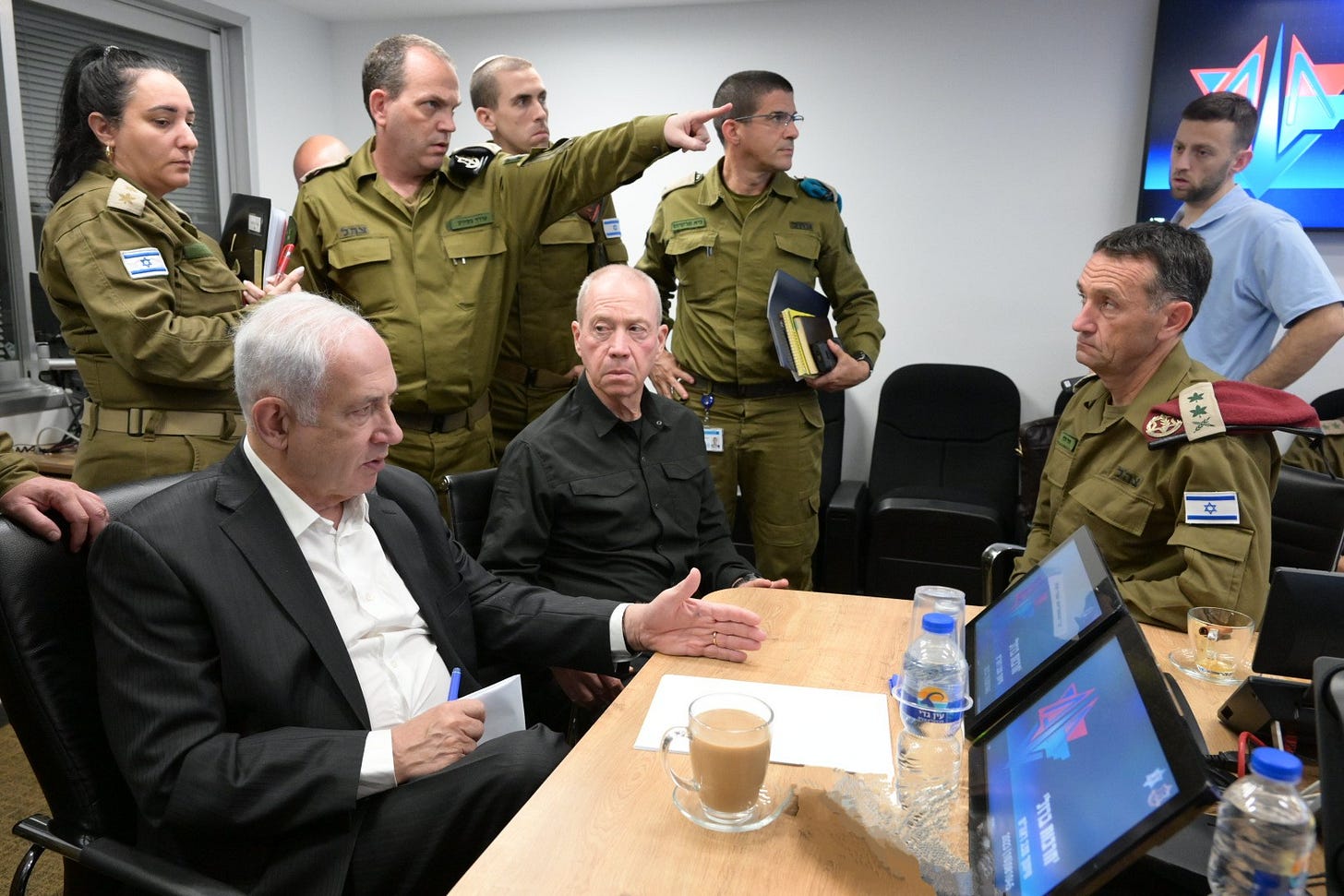The War In Gaza Forced Israel's Political Opponents To Work Together. But Underneath The Surface, Tensions Remain
A team of rivals joined together in Prime Minister Benjamin Netanyahu’s war cabinet. But beneath the veneer of unity, political differences and old resentments persist.

Two months after Hamas launched a barbaric attack on an Israeli musical festival that left over 1,000 dead, most of whom were civilians, Israeli forces find themselves still mired in a brutal urban conflict, as they push deeper into Gaza City, intending to eliminate Hamas’ leadership and rescue over 100 hostages still held in captivity.
The attack didn’t just imprint a deep mark on Israeli society but also significantly upended the country’s political landscape, blurring the lines between opposition and government.
Mr. Netanyahu, surrounded by largely inexperienced coalition partners and suffering from public backlash over his handling of the surveillance preceding the attack, needed to build domestic legitimacy fast. Reaching across the political aisle, Netanyahu invited long-term rival Benny Gantz and his liberal Blue-And-White party into the government, briefly augmenting his cabinet from accusations of political opportunism. His previous security cabinet, which would have ordinarily overseen a war, was viewed as too unwieldy and politically fractious and was slimmed down from ten ministers to just five.
Working discreetly, the new unity cabinet has gained the Israeli public’s trust, experts said. Its diverse political makeup has lent the government greater legitimacy abroad, ultimately buying the military more time to achieve its goals in Gaza — dismantling Hamas and bringing home the remaining hostages — amid intensifying international pressure. In a nation that relies on an army of conscripts and volunteers, it has been key to maintaining consensus.
“Netanyahu understood that he had lost the trust of the people and needed to bring in the centrists,” said Ehud Ya’ari, an Israel-based fellow of the Washington Institute for Near East Policy.
Despite the united facade projected to the public, underneath the surface, cracks have begun to appear in the new government, threatening to manifest into another political crisis that has the potential to undermine Israel’s current stability. The signs are mostly subtle: cabinet ministers shift uncomfortably during joint briefings, practically grimacing when reporters ask how they are getting along. However, the tensions go beyond personal rivalries. At stake is the trajectory of the war. Disputes range from the strategy toward Lebanon, the timing of the ground invasion and last month’s temporary cease-fire that allowed for a deal to exchange more than 100 hostages for Palestinian prisoners and detainees.
There have also been serious disagreements over what the future post-conflict landscape should look like, particularly when it comes to Gaza’s administration. Earlier this week, Netanyahu, alongside his right-wing coalition partners, rebuffed an American plan which would’ve allowed the Palestinian Authority, which currently administers parts of the occupied West Bank, to control Gaza after the war. Netanyahu cited fears that the PLA still harbours anti-Israeli sentiment as a reason for his dismissal. Instead, the Israeli Right favours a more stringent involvement in Gaza’s governance to safeguard Israel’s future national security. Gantz, on the other hand, who has mostly stayed silent on the issue, seems to align with the Biden Administration’s plan of ceding control to the PLA.
As the war in Gaza enters its third month, pressure is growing on Israel’s leaders to show results — internally, by crushing Hamas and freeing the remaining Israeli hostages; and externally, by stemming the spiralling civilian death toll and relieving a deepening humanitarian crisis. Those external pressures intensified this week when President Biden, one of Israel’s closest allies, called the military’s bombing campaign “indiscriminate.”
It is in many ways in Mr. Netanyahu’s interest to keep Israel in a state of war. A prolongation of the crisis allows him to stave off an inquiry into the failures of Oct. 7 and the political reckoning that will most likely follow.
For now, his war cabinet has not articulated at what point it will consider Hamas to be defeated and dismantled, nor has it delivered a clear vision for who will govern Gaza after the war. Its members have stuck to general formulations, saying that Israel will have to remain in charge of security for the foreseeable future but does not want to administer daily life in the enclave.
But, the longer Netanyahu extends the war, the more his approval ratings collapse. By elevating his political rivals from the opposition, the prime minister has seen his grip on power weaken, not strengthen, as he once predicted. Opinion polls conducted in the aftermath of the October 7th attack show Netanyahu’s party, Likud, in a distant second with around 17 seats, far behind Gantz’s Blue-and-White party, which was found to be fluctuating between 35 and 40 seats.
At some point, either due to the war’s slowing progress or disagreements over Gaza’s fate, the war cabinet is likely to fracture. And when it does, Israel will once again be at war with itself.



